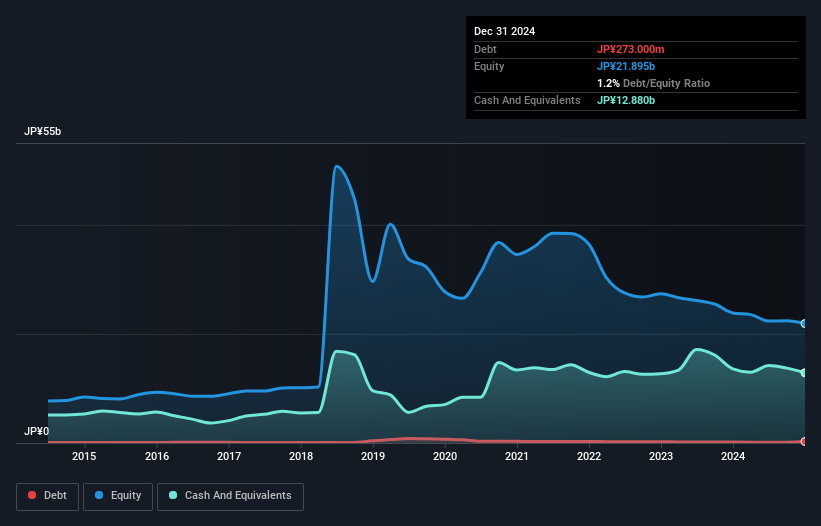
Warren Buffett famously said, 'Volatility is far from synonymous with risk.' So it seems the smart money knows that debt - which is usually involved in bankruptcies - is a very important factor, when you assess how risky a company is. Importantly, UNITED, Inc. (TSE:2497) does carry debt. But is this debt a concern to shareholders?
What Risk Does Debt Bring?
Debt is a tool to help businesses grow, but if a business is incapable of paying off its lenders, then it exists at their mercy. In the worst case scenario, a company can go bankrupt if it cannot pay its creditors. However, a more usual (but still expensive) situation is where a company must dilute shareholders at a cheap share price simply to get debt under control. Having said that, the most common situation is where a company manages its debt reasonably well - and to its own advantage. The first thing to do when considering how much debt a business uses is to look at its cash and debt together.
How Much Debt Does UNITED Carry?
You can click the graphic below for the historical numbers, but it shows that as of December 2024 UNITED had JP¥273.0m of debt, an increase on JP¥167.0m, over one year. However, its balance sheet shows it holds JP¥12.9b in cash, so it actually has JP¥12.6b net cash.

A Look At UNITED's Liabilities
The latest balance sheet data shows that UNITED had liabilities of JP¥2.42b due within a year, and liabilities of JP¥203.0m falling due after that. On the other hand, it had cash of JP¥12.9b and JP¥8.03b worth of receivables due within a year. So it can boast JP¥18.3b more liquid assets than total liabilities.
This surplus strongly suggests that UNITED has a rock-solid balance sheet (and the debt is of no concern whatsoever). On this view, lenders should feel as safe as the beloved of a black-belt karate master. Succinctly put, UNITED boasts net cash, so it's fair to say it does not have a heavy debt load!
View our latest analysis for UNITED
It is just as well that UNITED's load is not too heavy, because its EBIT was down 48% over the last year. Falling earnings (if the trend continues) could eventually make even modest debt quite risky. The balance sheet is clearly the area to focus on when you are analysing debt. But you can't view debt in total isolation; since UNITED will need earnings to service that debt. So when considering debt, it's definitely worth looking at the earnings trend. Click here for an interactive snapshot .
Finally, a company can only pay off debt with cold hard cash, not accounting profits. UNITED may have net cash on the balance sheet, but it is still interesting to look at how well the business converts its earnings before interest and tax (EBIT) to free cash flow, because that will influence both its need for, and its capacity to manage debt. Looking at the most recent three years, UNITED recorded free cash flow of 39% of its EBIT, which is weaker than we'd expect. That weak cash conversion makes it more difficult to handle indebtedness.
Summing Up
While we empathize with investors who find debt concerning, you should keep in mind that UNITED has net cash of JP¥12.6b, as well as more liquid assets than liabilities. So we don't have any problem with UNITED's use of debt. The balance sheet is clearly the area to focus on when you are analysing debt. However, not all investment risk resides within the balance sheet - far from it. Case in point: We've spotted 3 warning signs for UNITED you should be aware of, and 1 of them is concerning.
At the end of the day, it's often better to focus on companies that are free from net debt. You can access our special list of such companies (all with a track record of profit growth). It's free.
New: AI Stock Screener & Alerts
Our new AI Stock Screener scans the market every day to uncover opportunities.
• Dividend Powerhouses (3%+ Yield)
• Undervalued Small Caps with Insider Buying
• High growth Tech and AI Companies
Or build your own from over 50 metrics.
Have feedback on this article? Concerned about the content? Get in touch with us directly. Alternatively, email editorial-team (at) simplywallst.com.
This article by Simply Wall St is general in nature. We provide commentary based on historical data and analyst forecasts only using an unbiased methodology and our articles are not intended to be financial advice. It does not constitute a recommendation to buy or sell any stock, and does not take account of your objectives, or your financial situation. We aim to bring you long-term focused analysis driven by fundamental data. Note that our analysis may not factor in the latest price-sensitive company announcements or qualitative material. Simply Wall St has no position in any stocks mentioned.
About TSE:2497
UNITED
Engages in the ad-technology, content, and investment businesses in Japan.
Flawless balance sheet established dividend payer.
Market Insights
Community Narratives





